Subscribe to receive STORE research, news, and updates
About $STORE
User-owned computing and democratically governed AI. Own The Cloud.
State of STORE | Summer 2025: The Race to Electrify Computing and Democratize AI
User-owned computing and democratically governed AI

Author: Chris McCoy, CEO of STORE Research, Inc. (formerly Store Labs)
Reviewed by: Josh Lawler, Zuber Lawler (Securities Law), additional STORE advisors
Date Published: August 12th, 2025
This update contains forward-looking statements and is not a financial offer.
STORE Investment Summary: https://storecloud.org/state-of-store-summer-2025/investment
New to STORE? Get started here
STORE Series Seed Investment Memo: http://storecloud.org/seriesseedmemo
STORE Quick Deck: http://storecloud.org/deck
STORE Cloud Summary: http://storecloud.org/summary
Share the Word: As part of our efforts to spread the word about our latest STORE developments, we encourage you to forward this State Of STORE to your trusted network. Your support helps us grow.
STORE in 60 Seconds
What: User-owned and verifiable cloud computing meets constitutional mathematics for AI governance enabling collaborative frameworks for Big Tech democratization of AI and cloud computing
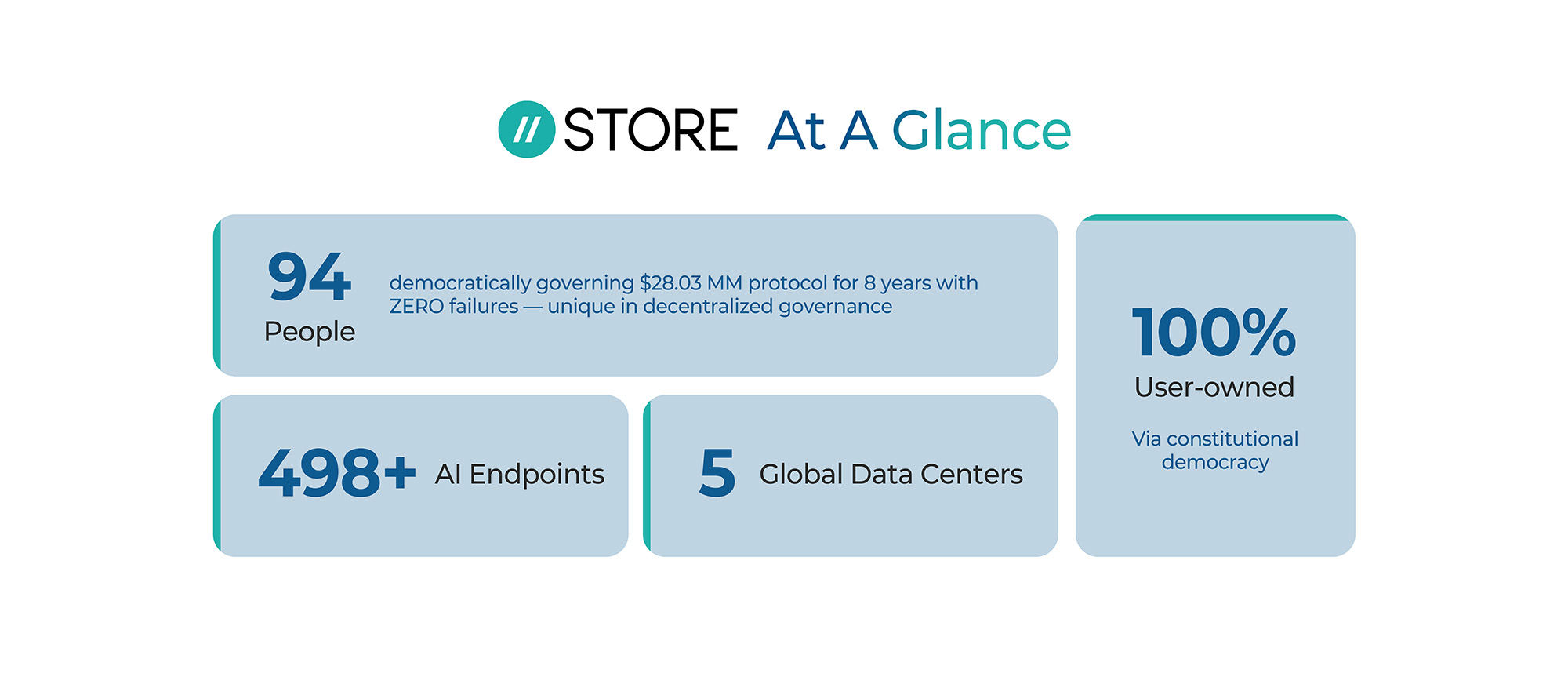
Constitutional Milestone Progress: We've raised $737,436 (18.4% of our $4M Series Seed target). We're $594,564 away from unlocking our next phase, the Marcus Aurelius Milestone, which will activate long-term token holder bonus vote for long-term thinking and support of our continued R&D.
Receive: Up to 4.44% protocol rewards through TREASURIES (3% inflation budget) + potential Second Governance participation (2% inflation pool, post-launch, auction-based)
Swiss Legal Framework:* 70% complete with critical MiCA compliance review in progress (October 2025). Awaiting critical direction from our legal partners MME to execute our BFT Democracy and verifiable cloud computing experiment in Switzerland.
Timeline: Target 2026: Token Generation Event and TREASURIES deposits to begin, 2026-2027: BFT Democracy evolution
*Swiss legal framework 70% complete with upcoming August 2025 review. Full legal protection pending completion of Swiss Association establishment and regulatory approval.
Executive Summary: Constitutional Mathematics for AI Governance
The Discovery: Promising research suggesting networks could become MORE democratic as they scale, the mathematical inverse of centralization. This counterintuitive finding requires extensive peer review starting Q1-Q2 2026.
The Proof: 94 governors, 20+ countries, 8 years, zero constitutional failures - operational proof that mathematical democracy works under real economic pressure.
The Experiment: Constitutional mathematics as humanity's attempt to solve the coordination problem of staying in control of augmented intelligence.
Research Commitment: Founder and founding entities including the future STORE Association in Switzerland have committed 60% of their tokens for up to 8 years in the forthcoming TREASURIES protocol: Treasury bonds for user-owned computing.
Reading Time: 15 minutes comprehensive, 5 minutes key sections only
Why This Research Matters Now
- $2T infrastructure dependency - 90% of AI runs on Big Tech clouds, creating systemic counterparty risk as AI becomes more essential
- Regulatory requirements emerging: EU AI Act enforcement in 2026 may require constitutional AI governance frameworks. STORE has 8 years of operational testing
- Constitutional mathematics research faces a natural timing constraint: The longer AI systems operate under corporate governance, the more difficult democratic alternatives become to implement
Intro
Eight years ago, we set out to build a zero-fee public blockchain owned by communities instead of corporations. We discovered how mathematical democracy could govern it, then realized these principles could democratize the computing layer underneath - the decentralized cloud. What we discovered was that we had chosen to tackle one of the hardest challenges in computer science, mathematical democracy of computing and AI at scale, during one of the most turbulent periods in technology history.
In what could be a defining moment for democratic governance, our multi-year operational experience indicates that STORE’s mathematical frameworks show promise for scaling democratic coordination beyond traditional limitations. We're applying governance mathematics to create democratic chain reactions that strengthen as AI advances.
Using the same systematic approach that my second cousin twice-removed, Nobel laureate Linus Pauling used in his prize-winning research, math-based R&D, global peer review ahead, and solutions built to withstand generations, we've built what we believe is the world's first operational framework for mathematically governed and verifiable AI infrastructure. Tested with real money, operational across five data centers, and preparing for peer review.
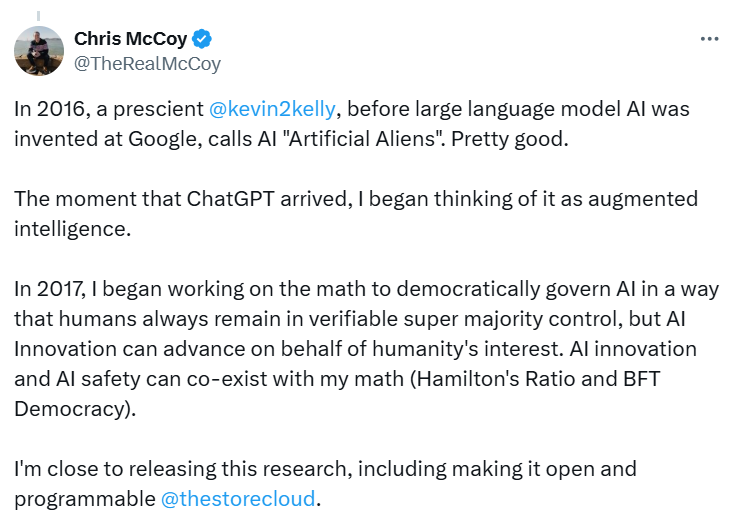
We're $594,000 from completing our Marcus Aurelius Milestone, which begins a vote to reward all holders for their long-term support of our research. From there, we attempt raising our token price to finish our $4 Million Series Seed. From there, launching our governance framework in Switzerland. Here's what we've achieved recently:
🆕 Progress Since Fall 2024:
✅ Swiss legal framework advanced from 60% to 70% complete
✅ $600K+ additional funding progress toward milestone goals
✅ Constitutional deployment phases mapped through First Launch TGE
✅ Big Tech partnership framework developed for symbiotic AI governance
✅ Operational validation strengthened: 73.74% participation rate maintained through market volatility
To our community, we thank you for your belief, patience, and contributions to our systematic breakthroughs in cryptography, governance, economics, and law. Thanks to you, STORE is operational and preparing to deliver user-owned infrastructure to the world.
This State of STORE publication outlines what STORE has been building, where we're headed with constitutional AI governance and decentralized cloud computing, and how we'll get there - including timelines and next milestones towards completion across both engineering and funding. Let’s get started.
Electrifying Computing Through Constitutional Infrastructure
90% of AI runs on centralized clouds, creating a $2+ trillion in counter-party risk (dependency on infrastructure you don't control) for crypto and the entire digital economy. Your AI models, your data, your applications – everything depends on infrastructure you'll never own.
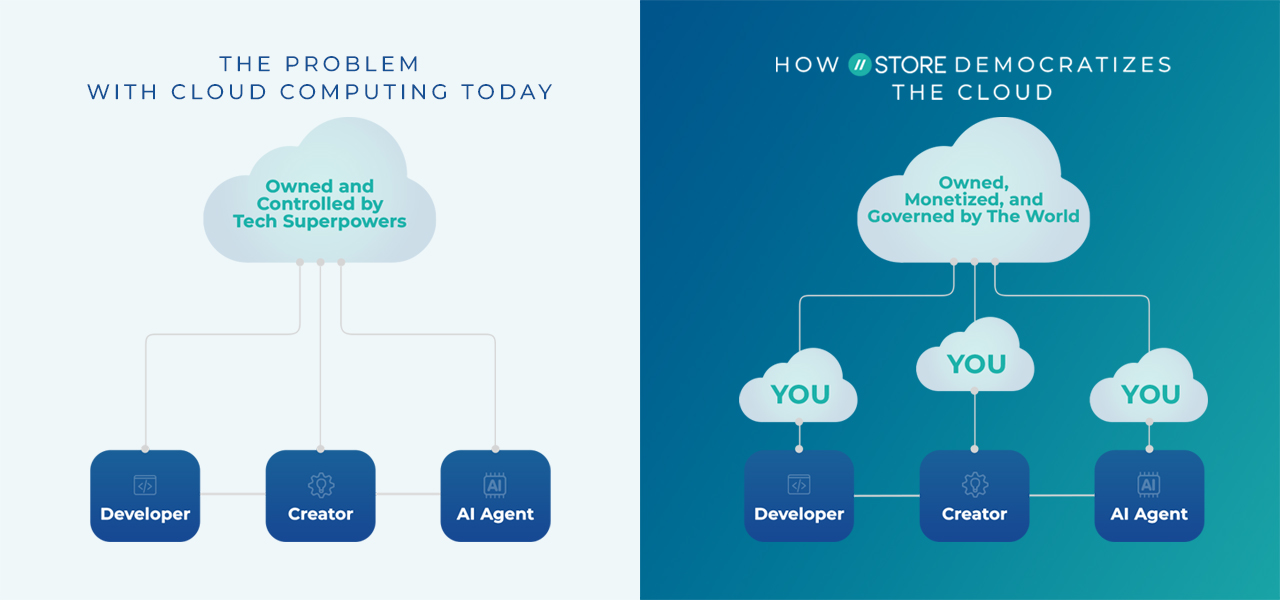
But, what if you owned the AI making decisions for you? What if your computing costs went to your community instead of Big Tech shareholders? What if, instead of hoping ChatGPT won't manipulate you, you had mathematical guarantees that your community democratically governed how AI systems behave?
What if you could receive protocol rewards for securing democratized cloud infrastructure through time-locked deposits and active governance participation?
Here's what this means for you: Instead of paying for cloud services as pure expense, you'd own infrastructure through two independent mechanisms:
TREASURIES (3% inflation budget): Deposit STORE tokens for infrastructure security, receive protocol rewards. No governance rights.
Second Governance (2% inflation pool, post-launch): Auction-based Governor seats ($10,000+ bid), active decision-making, share of inflation pool among all Governors.
Own The Cloud
STORE enables you to own a piece of computing infrastructure and share revenue from the world's first user-owned cloud operating under constitutional mathematics. STORE is Web3's electricity, a computing network where a suite of APIs power STORE AI's self-adapting intelligence.
Constitutional Mathematics Discovery: Hamilton's Ratio Breakthrough
The December 2017 Breakthrough: Inspired by Linus Pauling's Nobel research methodology, I began research into "Can democracy become stronger as AI gets smarter?" The governance breakthrough I'd been chasing for years suddenly crystallized.
The Hamilton's Ratio Discovery Email to My Team: "Our research indicates we've identified how distributed democratic systems could grow stronger without centralization. The key insight appears to be Multi-Level Power Distribution:
Traditional Network Effect: Value ∝ n²
Hamilton's Ratio Effect: Stability ∝ N × (1 - max(P_c)) Where: N = number of nodes, P_c = power concentration
The profound difference: While traditional networks centralize as they grow (think Big Tech), our Hamilton's Ratio research suggests systems could become MORE distributed with scale, though this counterintuitive finding requires extensive peer review and broader implementation testing."
Our research indicates this mathematical framework could address key challenges of AI governance: how to scale AI systems while maintaining alignment with human prosperity. We're working to prove this hypothesis through operational validation and peer review.
Historical Constitutional Foundation:
James Madison's Constitutional Mathematics (Federalist 51, 1788): "Ambition must be made to counteract ambition" - establishing the mathematical principle that no single entity should control more than 33% of power.
Alexander Hamilton's Economic Application (Report on Manufactures, 1791): Applied Madison's constitutional mathematics to economic sovereignty, creating frameworks for wealth distribution.
Hamilton's Ratio: The same 33% constraint that Madison developed for political governance, applied by Hamilton to economic policy, now implemented by STORE for AI governance through Byzantine Fault Tolerance protocols.
Why Constitutional Networks Could Become MORE Democratic With Scale: Our operational testing indicates that constitutional mathematics may invert traditional network centralization. While everyone assumes networks become less democratic as they grow (Facebook, Google, Amazon), our mathematical frameworks suggest the opposite could be possible.
The Big Discovery: Hamilton's Ratio research suggests networks could become MORE democratic as they scale, not less. Our 94 governors overseeing $28M indicate this works in practice: more participants appeared to mean more democratic stability, not less.
🔑 KEY TAKEAWAY: Constitutional mathematics show promise for enabling democratic oversight of large technology platforms through Hamilton's Ratio - organizations get stronger when democracy and capitalism mix, similar to how America grew stronger with each new state.
When It Actually Mattered
During the FTX collapse, our governors had to vote on repricing their own tokens while watching their portfolios crater. I figured participation would drop -who wants to make hard decisions when you're losing money? Instead, more people showed up. More people voted. The worse things got, the more democratic our community became. That's when I knew the math wasn't just working on spreadsheets - it was working with real human psychology under real pressure.
Hamilton's Ratio (see Historical Foundation above) is currently under internal validation and peer review process. While operational validation shows promise across $28M in decisions, formal peer review will be completed Q1-Q2 2026 before enterprise deployment and building developer platforms around this methodology as STORE launches and gains operational scale.
The Constitutional Foundation: 2019-2025 Evolution
Our constitutional governance didn't emerge overnight. It represents systematic development since 2019 when BlockTower Capital and Ari Paul helped us establish the foundational thinking for mathematical democracy. We designed frameworks that could evolve into increasingly decentralized governance while maintaining the foundational Byzantine Fault Tolerant Democracy.
Current Constitutional Structure (First Governance)
- One entity, one 10K vote with 51% consensus thresholds
- Executive branch (STORE Leadership Today) crafts governance proposals
- Community governors approve or reject with mathematical enforcement
- If rejected, executive branch must achieve 67%+ supermajority for implementation
Constitutional Evolution (Second Governance)
The framework evolves through multiple layers of checks and balances:
Executive Branch: Executes constitutional mandates and community decisions
Judicial Branch: Constitutional compliance review and interpretation
Governor Branch: Community representatives providing democratic oversight
Swiss Association Constitutional Infrastructure
Security Branch: Executes security requirements for judicial and executive branches
Treasury Branch: Executes financial requirements for judicial and executive branches
This bicameral structure is legally required for founding and long-term operation of BFT Democracy in Switzerland. We worked across four years with MME, our Swiss lawyers, to establish this constitutional framework that becomes MORE decentralized through multiple levels of checks and balances as each layer is added, increasing human resilience and agency rather than concentrating power.
We wouldn't be here today without this foundation. Since 2019, we've been proving that +2/3 math-based democracy can scale while strengthening constitutional protections.
The Research Magnitude
Eight years of systematic development across constitutional mathematics, cryptographic verification, and economic modeling has produced what we believe represents promising research in democratic AI governance. While political scientists theorized about governance scaling, I solved the mathematical frameworks they missed through systematic thinking rather than academic approaches.
We're not claiming to have solved AI alignment. We're sharing a mathematical framework with 8 years of operational validation that shows promise for scaling human authority as AI capabilities advance.
This mathematical breakthrough represents systematic research progression: from op-ed articulation to technical paper specification to STORE Constitution integration. Hamilton's Ratio mathematics don't just explain democratic scaling. They provide a blueprint for ensuring human prosperity in the age of advanced AI.
The timing advantage is crucial. While the world searches for verifiable frameworks to govern AI, our eight years of constitutional mathematics research has produced mathematical proofs for democratic scaling that traditional AI governance approaches lack. We're moving from theoretical framework to constitutional specification, ensuring these mathematical principles are built into STORE's founding architecture.
We believe this mathematics could enable any organization, including existing Big Tech companies, to democratize their platforms while maintaining technical capabilities. Constitutional mathematics don't replace corporate innovation; they provide frameworks for democratic oversight that could benefit shareholders and communities alike.
Operational Validation Unprecedented in Digital Governance
STORE First Governance
- 94 democratic participants across 30+ countries maintaining Hamilton's Ratio across all governance decisions
- $28M economically governed through real financial decisions using BFT Democracy
- 73.74% participation rate in democratic processes
- Ballots: 5 executed (76.95% average approval)
- Constitutional Violations: 0 (100% trusted rating)
- Status: Continues through Switzerland launch
Up Next: Second Governance (Post-Launch Transition)
- Auction-based Governor seats (17-51 initially)
- Minimum bid: $10,000+ equivalent in STORE
- Compensation: Share of 2% total inflation pool (allocated among ALL Governors)
- Voting: One entity, one vote (prevents plutocracy)
- Activation: After Switzerland launch + constitutional cap increase (3% → 5%)
- Separate from TREASURIES: Independent mechanisms with distinct purposes
Humanity deserves better than hoping a handful of large technology companies will self-regulate systems that control all computing resources, data, and ultimately artificial intelligence. The operational mathematics suggest democracy can grow stronger, not weaker, as coordination challenges increase.
Join the Public Peer Review: After eight years of operational validation, we're opening our constitutional mathematics to global peer review Q1-Q2 2026. We invite researchers, policymakers, and technologists to examine our frameworks, validate our mathematics, and contribute to the development of democratic AI governance at storecloud.org/democracy.
Systematic Execution & Swiss Legal Framework: Constitutional Protection at Scale
Milestone-Based Progress: Systematic Execution Against Plan: We chose patient capital over fast venture funding because constitutional mathematics research requires systematic validation. Each stage honors visionary figures whose contributions align with our constitutional objectives:
Constitutional Deployment Progress
✅ Technical Foundation (Ada Lovelace): 498+ AI endpoints electrifying computing under democratic governance
✅ Funding Initiated (Thomas Edison): $737K raised toward $4 MM Series Seed
🎯 Long-Term Store Owner Incentive (Marcus Aurelius): $595K remaining for constitutional governance validation phase triggering long-term token bonus incentive structures
🔄 Constitutional Foundation (John Locke): Legal founding of STORE Democracy in Switzerland
- Execution Status: Extensive R&D with MME lawyers since 2021, expedited to 70% specification complete
- Innovation: Successfully merging crypto law with ratified democracy enforced mathematically through nation-state law
🎯 Democratic Stewards (Benjamin Franklin): Founding elections for STORE Democracy board-level governance with checks and balances
🎯 Constitutional Ratification (Thomas Paine): +⅓ soft consensus on STORE Constitution using BFT consensus mechanism
🎯 Token Protocol (Hal Finney): Release schedule vote establishing repeatable mechanisms
🎯 Swiss Compliance (Grace Hopper): Token registration protocol ensuring regulatory compliance
🎯 Asset Transfer (Katherine Johnson): Tax-compliant transfer of STORE Research assets to STORE Democracy
🎯 Constitutional Launch (Neil Armstrong): Mathematical democracy deployment enabling AI democratization
Switzerland: Constitutional Protection for Infrastructure Investment
We chose Switzerland for bulletproof legal protection for community infrastructure ownership. We put $50,000 into researching governance structures across the UK, Ireland, Liechtenstein, and Singapore. All were sub-optimal for constitutional mathematics. Swiss associations are the only legal structure that can host BFT democracy with checks and balances over itself while maintaining regulatory compliance without centralization.
Investment Protection: Triple-Layer Security
- Mathematical Protection: Hamilton's Ratio prevents any single entity from gaining more than 33% control
- Legal Protection: Swiss Association structure creates constitutional protection for community infrastructure ownership
- Operational Protection: 8 years of governance validation with real economic decisions, plus $11.7MM founder commitment locked for 8-year terms
Execution Timeline (Subject to Funding and Technical Velocity)
- August to November 2025: Swiss legal framework completion (MME review)
- Target 2026: Token Generation Event + TREASURIES deposits begin
- Target 2026: Global constitutional infrastructure deployment
- Late 2026-2027: BFT Democracy evolution with checks and balances
The Great Computing Transformation: Racing Against Big Tech Consolidation
Today, 90% of computing runs on Big Tech infrastructure. A handful of companies decide, everyone else pays. We're in a crypto era with an opportunity to change this forever.
We're not just building alternative infrastructure. We're proving that mathematical governance enables consistent democratic coordination at scale.
The $2+ Trillion Problem That Created Our Opportunity
With the majority of AI models running on centralized clouds, we are overly reliant on Big Tech. Your AI models, your data, your applications – everything depends on infrastructure you'll never own.
Every entrepreneur building digital products today faces the same fundamental dependency: their entire technical foundation relies on infrastructure owned by Big Tech. Whether you're building fintech applications, AI startups, or e-commerce platforms globally, you're sending substantial portions of your budget to shareholders of companies that don't benefit from your success.
Amazon decides your costs. Google decides your access. Microsoft decides your features.
Every day we delay makes democratic governance harder to implement as AI systems become more entrenched in corporate infrastructure. We're not competing with Big Tech - we're building the constitutional frameworks they'll need for regulatory compliance and public trust. The window for symbiotic integration is closing.
This isn't sustainable, nor is it inevitable.
The transition moment: Global cloud services spending reached $723.4 billion in 2025, growing 21% annually toward $5.15 trillion by 2034. AWS (33%), Microsoft (23%), and Google (11%) control 67% of this entire market. This creates over $2 trillion in counter-party risk for the entire digital economy. Every breakthrough in AI makes their infrastructure more essential, not less. The more successful decentralized technologies become, the more they depend on centralized infrastructure designed to extract maximum value.

Democratic networks become more economically valuable to all participants over time, similar to how the original 13 colonies became more economically valuable as America expanded. While this theory requires validation at global scale, constitutional mathematics enable communities to own infrastructure rather than rent it from shareholders optimizing for quarterly extraction.
Crypto and AI accelerate Big Tech dependency. Every breakthrough makes their infrastructure more essential, not less. The more successful Web3 becomes, the more we depend on Web2 infrastructure designed to extract value from users.
Perfect timing: We're now in a crypto era where capital flows toward real infrastructure ownership. Switzerland is establishing the regulatory frameworks that will govern global digital infrastructure for the next decade. STORE is primed to ride the momentum of both of these waves.
The market is ready for computing that serves communities, not shareholders. The infrastructure transition we're building changes this fundamental relationship: from paying for access to owning infrastructure, from corporate extraction to community ownership, from shareholder optimization to mathematical democracy.
We Built the Alternative: User-Owned Infrastructure at Global Scale
Global Infrastructure That Works
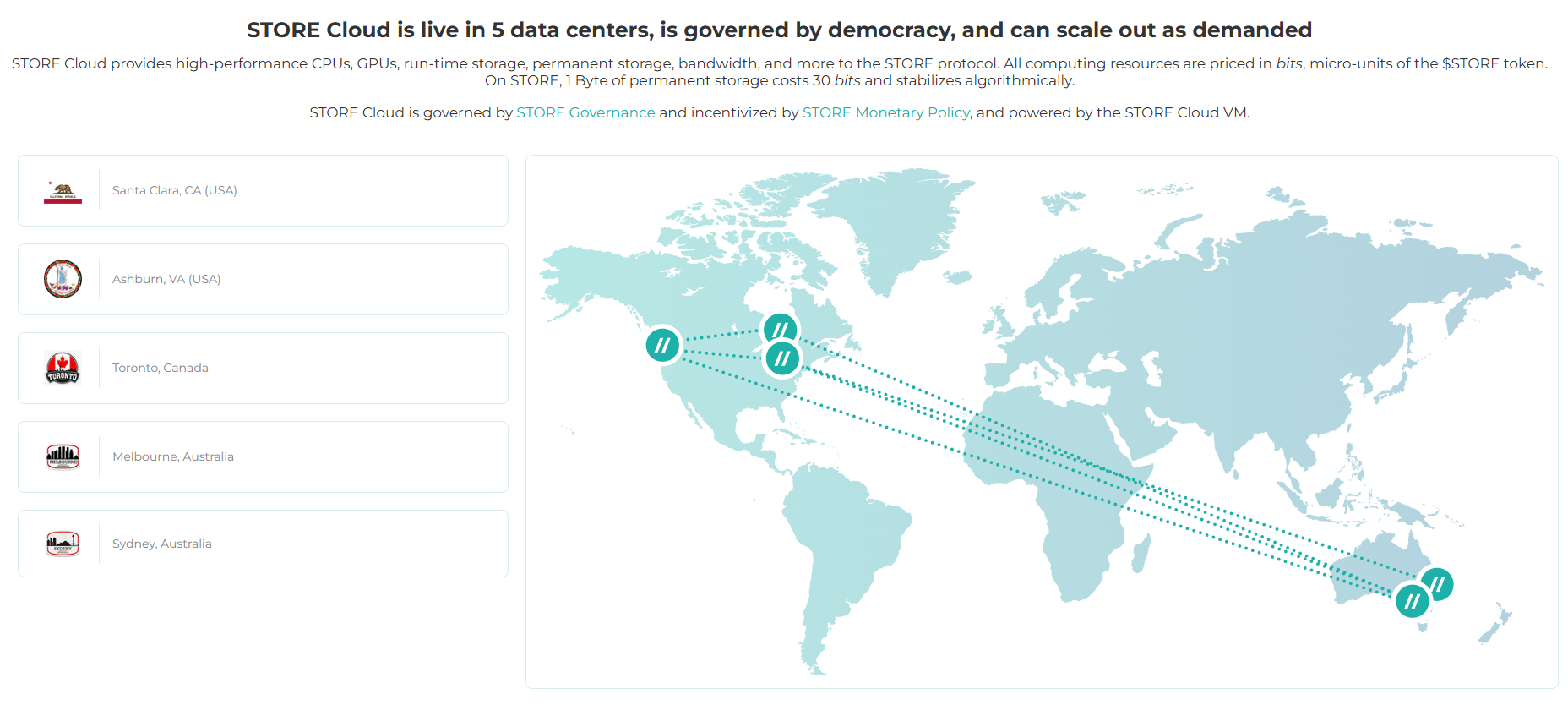
Unlike protocols still in whitepaper stage, STORE runs live infrastructure that electrifies computing, live on 5 data centers today:
- 26,400 virtual CPUs
- 240 TB RAM
- 12 PB (12,000 TB) cryptographically-secure permanent storage
- 5 global data centers (Santa Clara, Ashburn, Toronto, Sydney, Melbourne)
- 498+ live AI endpoints providing decentralized intelligence services

Each endpoint operates under what we call BFT Democracy, a mathematical framework ensuring the system becomes MORE democratic and secure as it scales globally. While AI companies advance capabilities, communities gain mathematical guarantees of democratic oversight through infrastructure they own, electrifying computing from corporate extraction to community empowerment.
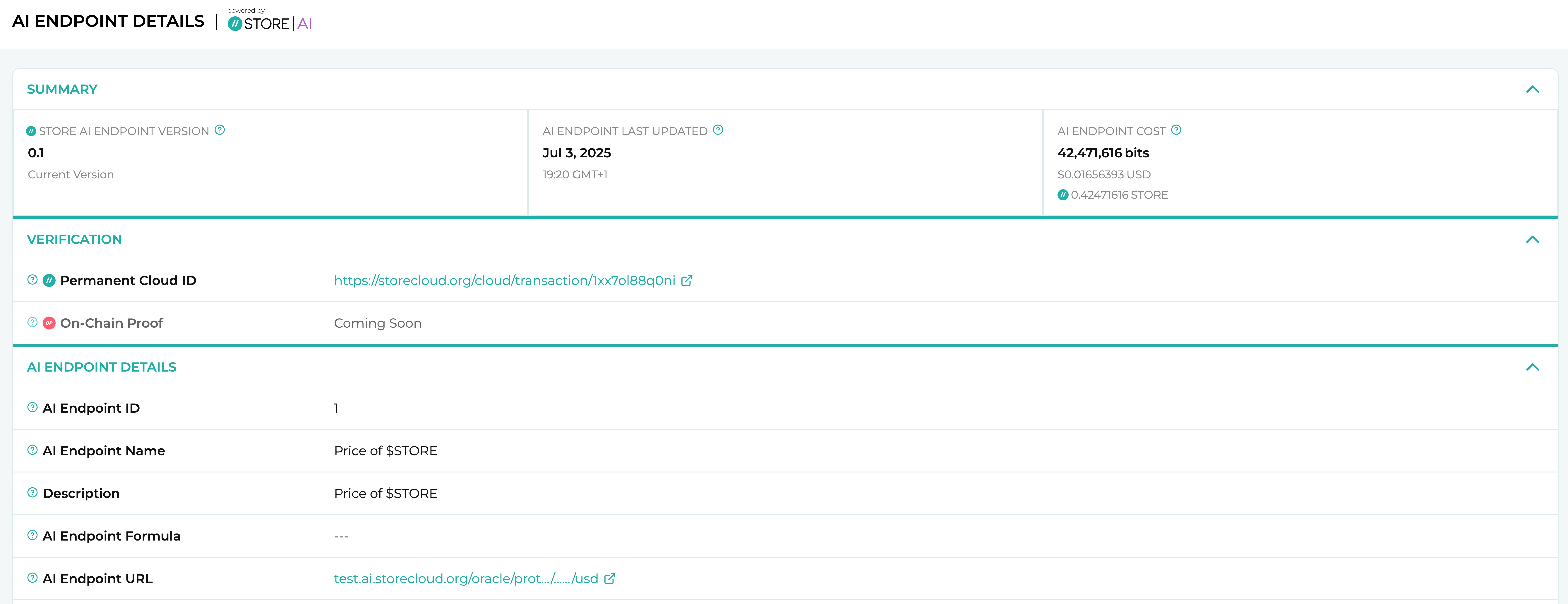
The systematic architecture: We built this user-owned infrastructure through five technical layers, each solving previously unsolved computer science problems to enable community ownership at global scale.
See live infrastructure: storecloud.org/infrastructure
Technology Breakthroughs: Your Computing Power, Your Control
STORE Dynamic AI
At the heart of STORE's technical achievement lies something substantial: STORE's Dynamic AI that enables you to own and control AI infrastructure rather than just rent it.
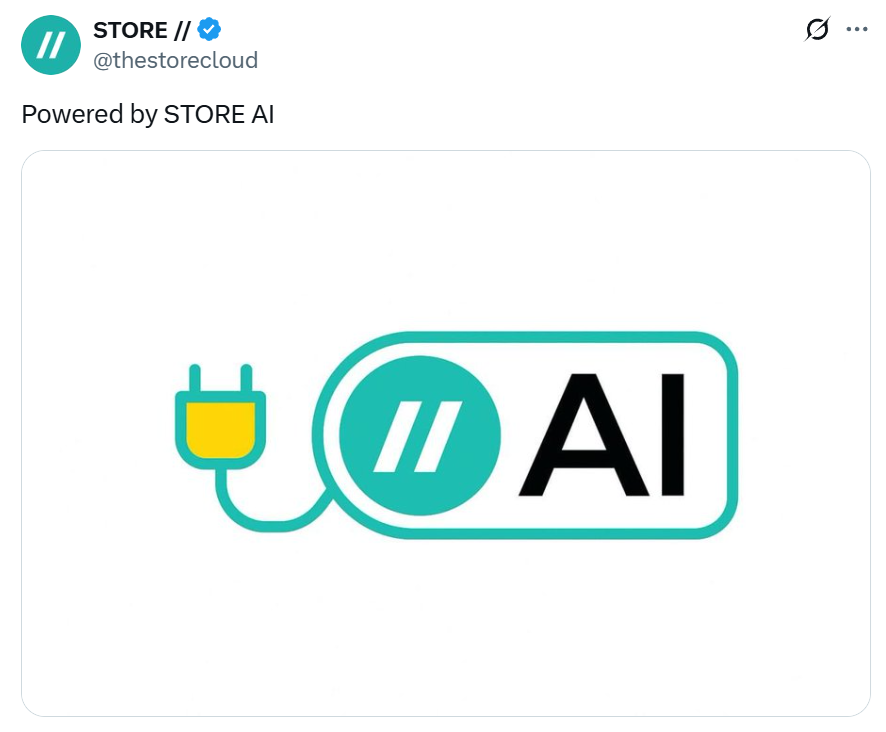
Traditional AI sits on top of computing systems that extract value from users. STORE's Dynamic AI sits beneath, providing the economic frameworks and governance systems that ensure you earn from AI computations running on infrastructure you own.
What this means for infrastructure owners: Communities can democratically govern how AI systems like ChatGPT make decisions while the AI companies continue building technical capabilities. You own the infrastructure, you share the revenue, you have democratic control over how AI serves your community's needs.
This creates a nearly impossible-to-replicate competitive advantage: AI companies cannot easily build democratic oversight of their own systems because their corporate structures require extracting maximum value for shareholders. We built independent infrastructure that makes democratic AI governance economically inevitable while ensuring communities benefit from every computation.
We built the independent infrastructure that makes community ownership mathematically possible while ensuring you earn from every AI computation.
See your infrastructure earning potential: ai.storecloud.org
Compliance and Legal Economy Architecture Rails (CLEAR): Lightning Speed That Makes Big Tech Look Slow
Our CLEAR transactions protocol transforms traditional business processes that take weeks into mathematical verifications that complete in seconds.
CLEAR Transactions Sub-Protocol Performance:
- Know Your Customer (KYC) verification: Significantly faster than traditional 2-5 business days
- Legal document processing: Substantially faster than traditional 3-7 business days
- Payment processing: Faster than traditional 1-3 business days
- Permanent storage with verification: Rapid processing with mathematical proof
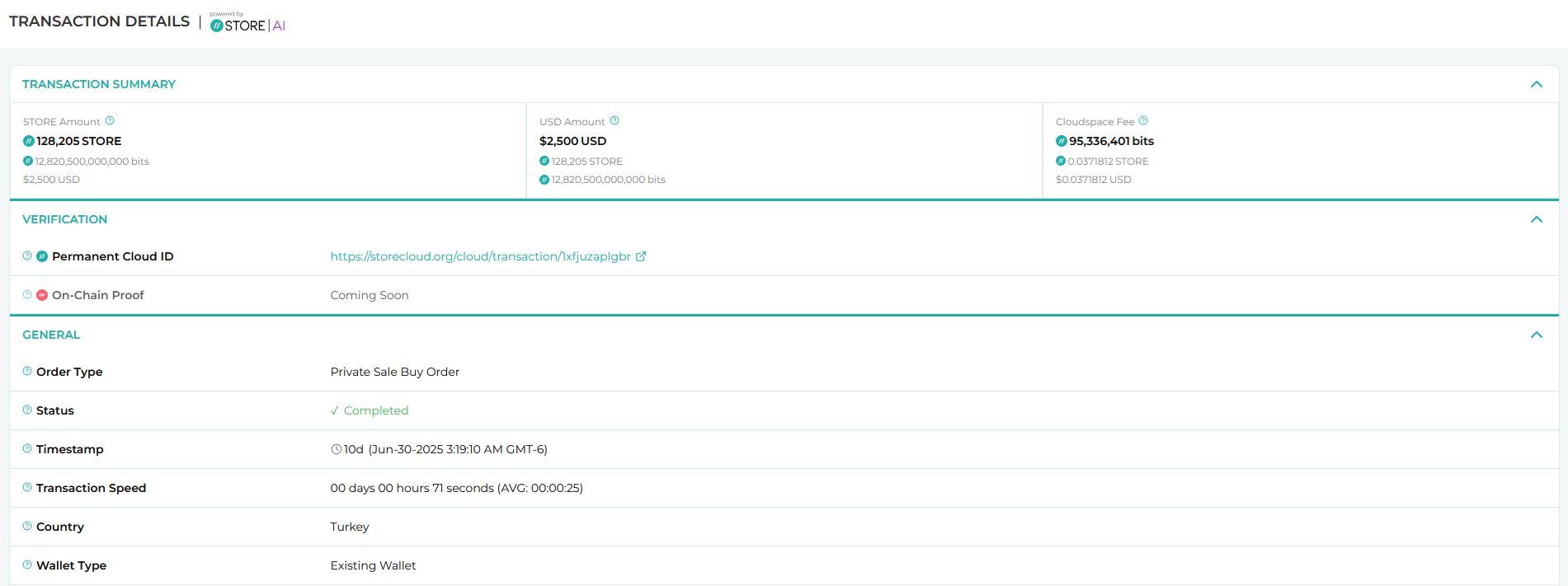
CLEAR bridges the gap between traditional finance (measured in days and paperwork) and cryptocurrency platforms (promising speed but lacking compliance frameworks). Through transparent, auditable workflows and dual-database architecture, CLEAR achieves authenticated regulatory compliance at global scale while operating under Byzantine Fault Tolerant Democracy.
This isn't just faster processing - it's a fundamental transformation of how business operations work. CLEAR streamlines everything from option exercises to copyright takedowns, ensuring consistent governance while preparing infrastructure for eventual decentralized community management of global economic activities.
Read more about CLEAR in our published paper.
View a live STORE transaction: https://storecloud.org/cloud/transaction/1xzmbd6e9j64
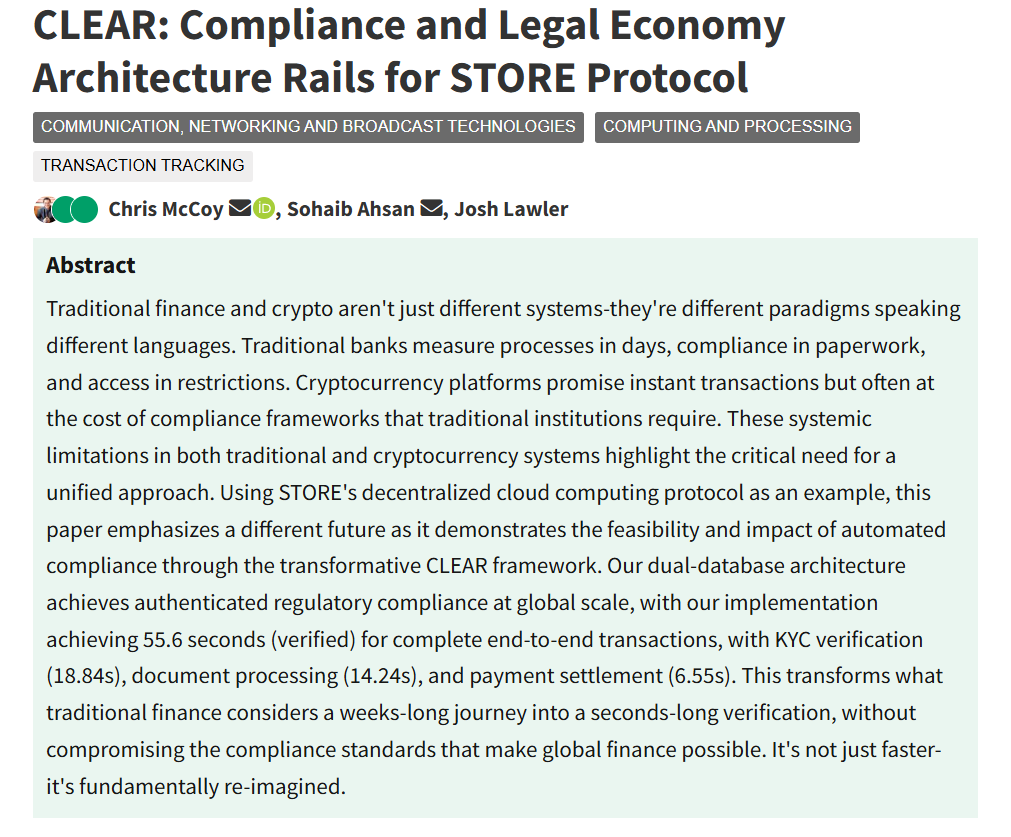
Enabling Autonomous Computing Through Decentralized Cloud ID Generation
The STORE protocol introduces a decentralized, collision-resistant Cloud ID generation system based on the CUID2 algorithm to enable autonomous computing capabilities without relying on a centralized authority. This system addresses the fundamental challenge of establishing a secure and trustworthy connection between off-chain computing and storage, and on-chain computing (blockspace or blockchain computing).
By leveraging advanced cryptographic techniques, including elliptic curve digital signatures, and the novel BlockFinBFT consensus mechanism, STORE provides a robust framework for generating unique, tamper-resistant identifiers (Cloud IDs) that serve as proofs of storage and computation across various blockchain networks, its STORE Cloud, and third-party applications.
Read more about STORE's novel Cloud ID architecture in our published paper.
Performance-Based Economics: Where Incentives Meet Outcomes
STORE's economic model rewards real governance contributions rather than speculation. When you provide security and participate in governance, you earn based on measurable performance metrics, not token price movements or trading volume. Additionally, TREASURIES participants earn U.S. Treasury-indexed returns for locking tokens long-term, creating genuine economic commitment to infrastructure development.
This approach aligns everyone's incentives with STORE's long-term success: communities benefit when infrastructure performs well, individuals earn when the protocol delivers value, and participants are rewarded for contributions that strengthen the network. Mathematical verification through Byzantine Fault Tolerant Democracy ensures these incentive structures remain focused on real outcomes rather than short-term market dynamics.
From Infrastructure Democracy to AI Democratization: The Constitutional Bridge
We spent eight years building constitutional mathematics for computing infrastructure and Layer 1 blockchains. Now we're discovering those same frameworks extend to democratize artificial intelligence systems across all platforms.
Here's the mathematical bridge: STORE's constitutional principles already govern computing resources democratically across our voting governors. The same math scales to democratize AI behavior. If Hamilton's Ratio prevents infrastructure capture, it prevents AI capture.
The Constitutional Bridge to AI Democratization
Before mathematical frameworks can democratize AI systems, they must first govern our own infrastructure through constitutional ratification. The Thomas Paine milestone (+⅓ soft consensus on STORE Constitution) establishes the constitutional foundation that scales from infrastructure governance to AI democratization.
Constitutional mathematics don't replace existing democracy. They extend democratic principles to new coordination challenges. Traditional democracy works for human-scale decisions. We're addressing machine-speed coordination that didn't exist when democratic institutions were designed.
We're researching constitutional frameworks that could enable democratic oversight of AI systems like ChatGPT and Claude through mathematical interfaces. This creates governance capabilities that AI companies can't build themselves - you can't democratically govern your own shareholders.
Here's where we're headed: Constitutional mathematics that could make AI democratization both profitable and inevitable. Communities benefit from AI advancement while preventing algorithmic tyranny through mathematical certainty, not corporate promises.
Three Phases of Continual Decentralization
First Governance (2016-2024): Foundation Layer
- 94 governors managing $28M across 20+ countries
- Single-layer constitutional mathematics: Hamilton's Ratio proven at scale
- 8-year validation: BFT Democracy shows strengthening efficacy with higher participation and consensus rates as governors scale
Decentralization Achievement: No single entity controls >33% of network decisions
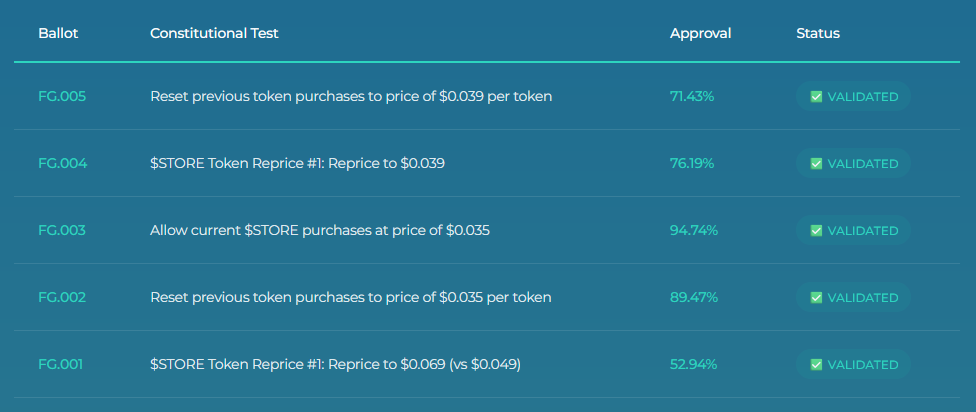
🔑 KEY TAKEAWAY: Unlike theoretical approaches, STORE has 8 years of real-money democratic governance with zero failures - operational proof that constitutional mathematics work under pressure.
Hilander Democracy (2024): Stress Test Layer
To test broader coordination challenges, we deployed STORE's BFT Democracy to manage the Kelso Hilander Hall of Fame, a community recognition program. This philanthropic project emerged from a personal commitment to my hometown, honoring my Uncle Kirby's dying wish to "do something great for the kids of Kelso." When we needed perfect coordination for community consensus on historical data and recognition decisions, the only research that could solve it was our own BFT Democracy.
Operational Results:
- 84 Hall of Fame nominations submitted across six recognition categories
- 60 unique voters participated
- 18 founding Qualified Nominees selected through 10% nomination threshold requirement
- Zero governance failures with complete constitutional compliance across all layers
Constitutional Upgrades Through +2/3 Democracy: The system evolved through supermajority consensus including changes such as: nomination threshold reduced to 10% (demonstrating soft consensus for surfacing nominees), category consolidation ensuring nominees compete where they had most impact, and move to simple majority (51%) for HOF induction. Through BFT Democracy, the Hilander Hall of Fame adapted and grew to meet community needs and wishes.
Key Validation: BFT Democracy in local communities was pioneered by my hometown, not by design, but out of necessity. The system successfully coordinated complex decisions involving families, businesses, and civic organizations, proving constitutional mathematics scale within communities with citizens precisely following mathematical rules and zero constitutional violations.
Decentralization Advancement: Proved that constitutional mathematics work beyond protocol economics, scaling democratic coordination to community recognition with real stakes and permanent consequences. It's working beautifully in Kelso, demonstrating how communities can reach consensus on data itself.
Bringing It Home: When I brought constitutional democracy back to Kelso, the town that raised me, something unexpected happened. People didn't just vote and leave. They started talking to classmates, teammates and fellow Hilander fans they hadn't spoken to in years. "The Hall of Fame voting brought us together in ways we didn't expect," was what I kept hearing. Kelso taught me that democracy isn't just about the math. It's about communities choosing to trust each other enough to make decisions together. If it works in a timber town of 10,000, maybe it can work when billions of AI decisions need human oversight.
Second Governance (2025): Multi-Layer Decentralization
- Swiss-compliant architecture with continual decentralization through layers
- Constitutional checks and balances preventing capture at ANY layer
- Mathematical guarantee: More participants = more decentralized control
Decentralization Breakthrough: Governance becomes MORE distributed as AI capabilities advance
The Architecture: Each phase added layers of decentralization. Second Governance creates the first multi-layer constitutional system for AI control.
Second Governance Architecture: Continual Decentralization Through Constitutional Layers
Layer 1: Computational Democracy (First Governance Proven)
- 498+ AI endpoints under distributed constitutional control
- Community ownership preventing corporate infrastructure capture
- Hamilton's Ratio: No entity controls >33% of compute resources
Layer 2: Swiss Association Checks (Legal Compliance Layer)
- Independent oversight ensuring international democratic legitimacy
- Constitutional enforcement preventing governance capture
- Legal framework enabling global AI democratic coordination
Layer 3: Elected Judicial Branch (Democratic Oversight Layer)
- Community-elected board with AI decision appeal authority
- Regular elections ensuring continuous democratic accountability
- Power to override algorithmic decisions affecting human communities
Layer 4: Stakeholder Governors (Community Representation Layer)
- Diverse global stakeholder representation across AI development
- Supermajority override capabilities for judicial branch decisions
- Direct democratic input on AI behavior, training, and deployment priorities
Continual Decentralization Principle: Each layer operates under Hamilton's Ratio. As the system scales, power distributes MORE widely, not less. More AI endpoints = more computational democracy. More stakeholders = more representative governance. More participants = mathematical immunity to capture.
Revolutionary Architecture: While traditional systems centralize power as they scale, Second Governance decentralizes power proportionally with growth.
Impact: Shows how Second Governance creates decentralization architecture.

Enterprise Market Governance Opportunity
We believe Fortune 500 companies will eventually need democratic AI governance solutions - potentially representing a significant enterprise market as AI spending continues growing. According to recent data, only 18% of enterprises have AI governance councils authorized to make decisions, while $644 billion flows into GenAI globally with 60% of firms seeing poor returns. The AI governance market is exploding from $308 million (2025) to $1.4 billion (2030) at 35.7% CAGR (Compound Annual Growth Rate)..
While there is no guarantee Fortune 500 companies will adopt democratic AI governance frameworks, STORE is currently researching, inventing, and building to serve this market. Our symbiotic approach could allow enterprises to maintain existing AI investments while potentially adding democratic oversight through STORE's infrastructure. For example, Microsoft might continue developing Copilot's capabilities while communities could gain democratic influence over how those capabilities serve their needs.
For AI companies, constitutional frameworks could provide regulatory compliance and public trust without sacrificing innovation speed. Instead of fighting regulation, companies could demonstrate democratic accountability through constitutional mathematics that create competitive advantages through trust, not just technical capabilities.
Democratically Governed Research: We're developing these constitutional frameworks to be implemented by any organization seeking democratic governance at scale, including existing technology companies. Our upcoming technical paper on Byzantine Fault Tolerance and Constitutional Mathematics will provide detailed specifications for implementing these systems across different organizational structures.
Regulatory Compliance at Scale
Constitutional mathematics provide what AI companies need most: mathematically verifiable democratic oversight that satisfies regulatory requirements while preserving innovation speed. EU AI Act enforcement carries fines up to €35M or 7% of global revenue. Constitutional frameworks provide the compliance infrastructure that scales with AI capabilities rather than constraining them.
The Partnership Advantage
8 years of operational constitutional democracy with $28M in private market real economic decisions. Competitors can copy our approach, but they can't replicate our governance track record or Swiss legal framework (in development), and they can't deploy democratic oversight of their own systems due to shareholder value conflicts. This creates symbiotic opportunities where AI companies focus on capabilities while STORE provides the democratic infrastructure that accelerates adoption through trust and regulatory compliance.
The Economic Model: TREASURIES Protocol Security Commitment Program
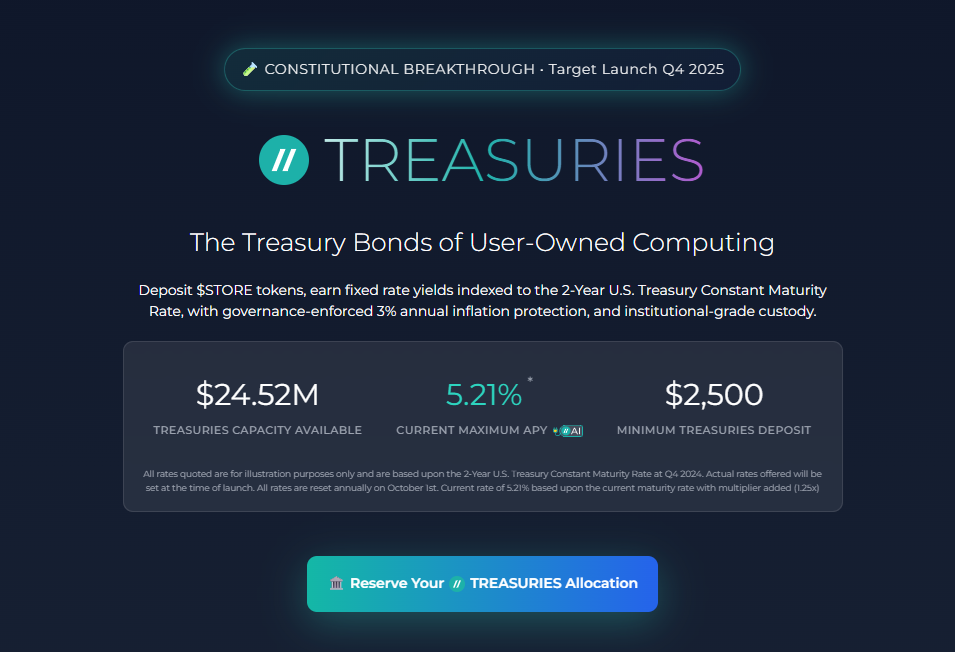
STORE TREASURIES represents a unique infrastructure security mechanism: a protocol deposit program operating under constitutional mathematics (First Governance, operational 2020-2025) that rewards long-term network security provision.
Participants deposit STORE tokens for fixed terms (2, 4, or 8 years), receive protocol rewards from a dedicated 3% annual inflation budget, benchmarked to the 2-Year U.S. Treasury Constant Maturity Rate for transparent monetary policy. Rewards funded by protocol issuance, not fee redistribution or profit-sharing.
Protocol Rewards Under Constitutional Governance (First Governance oversight)
2-Year Terms*: 3.55% effective annual percentage yield
4-Year Terms*: 3.91% effective annual percentage yield
8-Year Terms*: 4.44% effective annual percentage yield
*Rates benchmarked to 2-Year U.S. Treasury Constant Maturity Rate for transparent monetary policy. Rewards funded by protocol issuance from dedicated 3% annual inflation budget. Not fee redistribution or profit-sharing. Current rates shown reflect Q4 2025. Actual rates offered will be set at the time of launch. All rates are reset annually on October 1st.
Example Deposit Scenario: A 256,410 STORE deposit (approximately $10,000 at current $0.039 pricing) locked for 8-year terms would receive approximately 11,385 STORE annually at 4.44% protocol rewards rate, funded from dedicated 3% inflation budget.
Note: Actual rates set at launch and reset annually (October 1st) based on 2-Year U.S. Treasury Constant Maturity Rate benchmark.
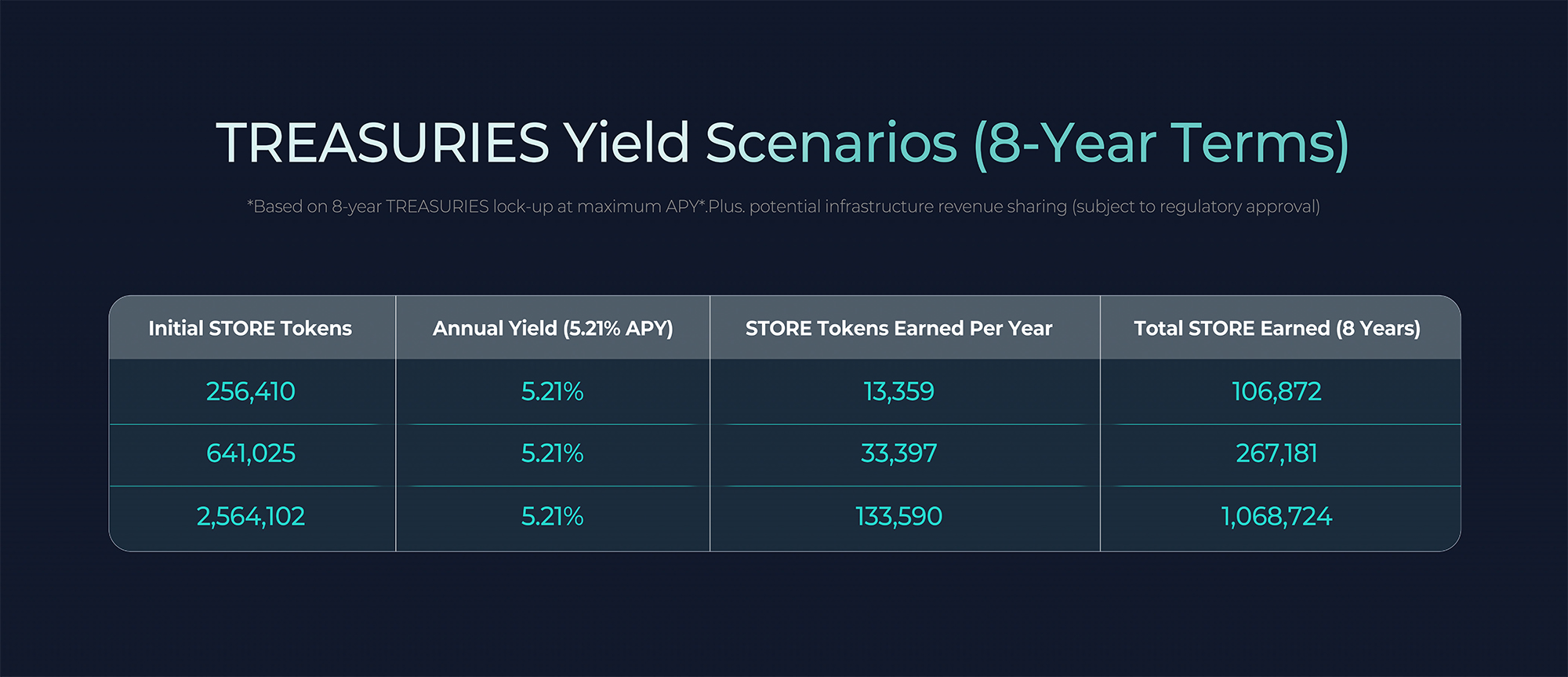
Commitment Extension Incentives: Following long-term alignment principles, depositors receive additional bonuses: 5% on quarterly rewards re-committed to network security during the term, plus 5% on cumulative deposits when extending into new deposit terms at completion. Combined, these reward optimal long-term security provision.
Phase 1 (Switzerland Launch - ETA 2026):
- TREASURIES active (3% inflation budget)
- First Governance continues oversight
- Protocol rewards: 3.55-4.44% based on deposit term
- No governance rights (pure security deposits)
Phase 2 (Post-Launch):
- Second Governance activation via auction mechanism
- Constitutional cap increase vote (3% → 5%, requires +⅔ approval)
- Governance pool: 2% total inflation allocated among ALL Governors
- Independent from TREASURIES (separate mechanisms)
RSVP for TREASURIES participation and review detailed yield mechanics and regulatory timeline at: https://storecloud.org/treasuries
The economic discipline is substantial: Founders and founding entities are committed to depositing into TREASURIES for 8-years terms.. No exit strategies. No liquidity events. Real money betting on mathematical frameworks over market speculation, demonstrating our conviction that constitutional mathematics will transform digital infrastructure from speculation to institutional asset class.
Key Features:
- Constitutional Protection: 3% annual inflation cap enforced by First Governance (operational 2020-2025)
- Institutional Custody: BitGo enterprise-grade security and compliance
- Commitment Extension Bonuses: Additional rewards for long-term security provision
- No Governance Rights: Pure infrastructure security deposits (governance separate)
- Transparent Benchmarking: Rates indexed to 2-Year Treasury for sound monetary policy
TREASURIES Governance Separation:
- TREASURIES = Infrastructure security only (no governance rights)
- Second Governance = Separate mechanism (auction-based, post-launch)
- Can participate in both = Deposit in TREASURIES + compete for Governor seat
- One entity, one vote = Regardless of deposit size or governance stake
Second Governance Transition (Post-Launch):
Auction-based Governor seat allocation activates after:
✓ Switzerland launch complete
✓ TREASURIES operational
✓ STORE Association established
✓ Constitutional cap increase approved (3% → 5%, requires +⅔ vote)
Mechanism:
- 17-51 Governor seats initially (multiple markets possible)
- Minimum bid: $10,000+ equivalent in STORE
- Compensation: Share of 2% total inflation pool (divided among ALL Governors)
- Selection: Highest bids win available seats
- Voting: One entity, one vote (prevents plutocracy)
- Requirements: Active participation in cloudspace decision-making
Separate from TREASURIES:
- TREASURIES depositors receive NO automatic governance rights
- Governor seats must be won through competitive auction
- Can do TREASURIES only, Governance only, or both (independent mechanisms)
STORE is working with Swiss and U.S. regulators to confirm the regulatory status of STORE tokens and TREASURIES yields, ensuring compliance with FINMA, SEC, and MiCA requirements. Updates will be shared with our community as regulatory clarity is achieved.
STORE is working with Swiss and U.S. regulators to confirm the regulatory status of STORE tokens and TREASURIES yields, ensuring compliance with FINMA, SEC, and MiCA requirements. Updates will be shared with our community as regulatory clarity is achieved.
📖 COMING SOON: The STORE TREASURIES Paper
Release Timeline: ETA 2026
STORE will shortly release the comprehensive TREASURIES paper detailing our novel approach to sound money for long-term infrastructure funding in the age of decentralization and AI. This technical paper will cover:
Core Monetary Innovation
Constitutional Money Systems: How governance-enforced inflation caps create sound money for digital infrastructure
Protocol Rewards Methodology: Mathematical frameworks for transparent reward allocation from constitutional inflation budgets
Dual-Mechanism Economics: Independent infrastructure security (TREASURIES) and governance participation (Second Governance) systems
Swiss Legal Architecture: Constitutional protection for digital monetary systems under Swiss law
Technical Implementation
Reward Calculation Methodology: Algorithms benchmarking 2-Year U.S. Treasury rates for transparent monetary policy in protocol issuance allocation
Inflation Budget Distribution: Automated systems for allocating protocol rewards from dedicated 3% budget to depositors based on term length and deposit amount
Risk Management Frameworks: Mathematical approaches to protecting community infrastructure
Subscribe for Early Access: Get detailed technical specifications for STORE's monetary system, trade system, treasury system, and constitutional governance frameworks.
Subscribe at storecloud.org/treasuries
This paper represents STORE's novel approach to sound money for long-term infrastructure funding, essential reading for understanding how constitutional mathematics enable sustainable community infrastructure ownership in the age of AI.
Competitive Advantages Through Operational Validation
Many years of systematic democratic infrastructure development has created competitive advantages that cannot be easily replicated, especially our approach where communities own both the monetary system and the AI that governs computing infrastructure.
What Competitors Cannot Replicate
8-Year Operational Democracy: No protocol has demonstrated constitutional governance with $28M in real economic decisions across multiple market cycles
First Governance Track Record:
- 94 Governors across 30+ countries (operational 2020-2025)
- 5 ballots executed with 76.95% average approval
- 0 constitutional violations (100% trusted rating)
- Survived COVID 2020 and FTX 2022 stress tests
- Swiss Constitutional Framework: Four years of legal development creates regulatory moats that competitors cannot build overnight
- Mathematical Consensus Innovation: Hamilton's Ratio and BFT Democracy represent breakthrough research that requires operational validation, not just theoretical implementation
- Founder Economic Alignment: $11.7MM locked for 8 years under constitutional governance demonstrates commitment that venture-backed competitors cannot match
- AI-Native Infrastructure: 498+ endpoints designed for democratic governance from the ground up, rather than retrofitting centralized systems
- Traditional cloud providers like AWS cannot democratize their infrastructure due to shareholder obligations. Crypto protocols lack operational governance history and regulatory frameworks. Emerging Web3 clouds lack constitutional mathematics and the Swiss legal framework.
Technical Fortress: Patents and Permanent History
We hold two U.S. patents on our BlockFinBFT blockchain consensus algorithm, providing legal protection for core innovations while enabling open implementation for constitutional governance frameworks.

See complete transaction history: storecloud.org/transactions
Operational Infrastructure Beyond Replication
Our infrastructure includes permanent storage architecture where every transaction receives cryptographic verification into multiple blockchain networks. Dynamic routing across five data centers achieves sub-8-second global response times. Our BlockFinBFT consensus algorithm handles Byzantine faults while maintaining web-scale performance that rivals traditional cloud providers.
Permanent Storage Architecture: Every transaction cryptographically verified into Ethereum and Arbitrum
Bandwidth Optimization: Dynamic routing across 5 data centers with global response times
Consensus Innovation: BlockFinBFT algorithm handling Byzantine faults while maintaining web-scale performance
AI-Native Infrastructure: 50+ endpoints each operate under individual AI intelligences with mathematical rule sets, creating AI-native infrastructure rather than AI bolted onto traditional computing systems.
Decentralized Cloud IDs: Enabling autonomous computing, and based on the CUID2 algorithm, used to create collision-resistant identifiers that bridge off-chain computing with blockchain networks.
STORE infrastructure uses cryptographic protocols and blockchain-verified storage to protect user data, ensuring compliance with Swiss FADP, U.S. CCPA, and EU GDPR, giving communities secure control over their digital assets.
Future Opportunities
The Corporate Opportunity
OpenAI cannot easily build Byzantine Fault Tolerant Democracy oversight of their own systems, not because they lack technical capability, but because their corporate legal structure makes authentic democratic governance impossible. Their board has fiduciary obligations to maximize shareholder value, which creates inherent conflicts with distributing genuine power to communities.
This creates a symbiotic opportunity: AI companies excel at building capabilities, while STORE provides the independent democratic infrastructure they need for regulatory compliance and public trust. Google cannot authentically distribute power over search algorithms using constitutional mathematics, but they can integrate with constitutional frameworks that provide democratic oversight. Microsoft cannot give communities democratic control over AI decisions through Hamilton's Ratio governance internally, but they can partner with infrastructure that enables this democratically.
Global Constitutional Infrastructure: Nation-State Partnerships
As STORE evolves and permanent storage grows, we'll introduce protocols that move us into different parts of the world for application deployment. These expansion moments will become important governance decisions because they may develop into partnerships with the nation-states where we establish presence.
Ultimately, we're bringing decentralized AI and permanent storage into their countries through STORE's constitutional infrastructure. We may invite nation-states to participate in STORE treasuries as strategic partners. Everything's on the table in this new future of constitutional computing.
The upcoming STORE Monetary System and STORE Treasuries paper will reveal a level of thinking about decentralization, computing, and trade not yet seen in the industry. Constitutional mathematics applied to global infrastructure ownership represents the next evolution of how democratic societies can maintain sovereignty in the age of artificial intelligence.
The Partnership Advantage
STORE is emerging as the foundational developer platform that enables AI companies and networks to implement democratic governance through proven constitutional mathematics. AI companies get regulatory compliance, public trust, and accelerated adoption through ready-to-integrate frameworks. Communities get democratic control over AI systems through mathematical guarantees rather than corporate promises. STORE provides the constitutional APIs and governance infrastructure that make this symbiosis profitable for everyone.
The fundamental insight: Systematic democratic infrastructure development requires independent governance that corporate shareholders cannot compromise. We built independent constitutional mathematics as a developer platform that makes democratic AI governance mathematically possible for any network, creating value for AI companies rather than competing with their core capabilities while enabling other AI networks to become democratically governed themselves.
STORE Pre-Launch Economy: Progress Through Our Milestone
Our funding approach reflects the constitutional principles governing our infrastructure: transparent milestones, community accountability, and mathematical verification of progress.
Current Status: $737,436 raised (18.4% of $4 MM goal)
Remaining to Marcus Aurelius Milestone: $594,564 remaining to complete validation phase at $0.039 pricing, demonstrating constitutional governance through community bonus vote, then gateway to $2.7 MM-$4 MM Switzerland deployment funding with institutional investors
Track our live progress: storecloud.org/economy
After Marcus Aurelius: Continue fundraising toward $2.7 MM minimum deployment, $4 MM+ ideal for Series Seed completion with systematic incentive structures for constitutional governance supporters
Use of Milestone Funding: Swiss legal framework completion → TREASURIES technical launch → Byzantine Fault Tolerant Democracy at global scale
Investment Window: Current $0.039 pricing available until Marcus Aurelius milestone completion, which triggers institutional pricing tier as we transition from research phase to deployment phase.
Share the Research & Earn Rewards
We need your network. Democratic governance research requires global peer review and support. Every strategic introduction accelerates democratic AI infrastructure for everyone.
Referral Rewards: Your successful referrals investing $25,000+ earn you 5% bonus tokens. We're building this together.
Investment Participation Options
1) Token Ownership: $0.039 per token*
*$0.039 pricing available until Marcus Aurelius milestone completion ($595K remaining), then pricing increases toward $4MM Series Seed completion
- Purchase Tokens: storecloud.org/buystore
NOTE ON TOKEN PURCHASES: The offer to receive a 100% bonus on STORE tokens has since expired. That offer was available for the first $100,000 of tokens sold from the time the State of STORE was published and we are happy to announce that milestone was reached quickly
2) Equity Participation: For investments of $25,000 or more, opportunity to acquire shares in the protocol development company along with bonus token warrants
- Purchase Shares: storecloud.org/equity
Looking to make a large-scale investment? Please contact us at team@storecloud.org
The information provided regarding STORE Research, Inc., STORE Switzerland, and STORE tokens is for general informational purposes only and does not constitute an offer to sell or a solicitation to buy securities. Constitutional mathematics ensure no single entity controls >33% of network decisions, but do not guarantee investment returns or eliminate all risks.
For detailed investment analysis, see https://storecloud.org/state-of-store-summer-2025/investment-summary
STORE Token Utility
First Governance: $10,000+ holdings grant one vote in First Governance (operational through Switzerland launch)
Infrastructure: STORE token used for compute, storage, and AI usage payments
TREASURIES: Deposit STORE in fixed-term accounts (2, 4, or 8 years) to receive 3.55-4.44% protocol rewards from 3% inflation budget (no governance rights)
Second Governance: Post-launch auction-based Governor seats ($10,000+ bid, share of 2% inflation pool, one vote per entity)
Ultimate Insider Validation: $11.7MM Constitutional Commitment
Economic alignment unprecedented in digital infrastructure demonstrates the founding entities' conviction that constitutional mathematics will transform digital infrastructure from speculation to institutional asset class.
Founding entities including STORE US and STORE Switzerland have committed $11.7 million in TREASURIES deposits, representing 60% of their total STORE holdings, for maximum 8-year terms. This demonstrates conviction in protocol rewards mechanism and long-term infrastructure value creation through constitutional governance (First Governance, operational 2020-2025).
When founding entities commit the majority of their holdings to constitutional governance for maximum terms, it demonstrates mathematical confidence that democratic infrastructure creates superior long-term value compared to traditional corporate structures optimized for quarterly earnings.
A Path Forward for Everyone: As we prepare to release our research around BFT Democracy, we'll share how major technology companies can democratize their own systems to democratize their AI, in ways that benefit both shareholders and humanity. Constitutional mathematics don't threaten innovation; they provide regulatory compliance and public trust that create competitive advantages through mathematical certainty rather than corporate promises.
For AI Companies: Competitive Advantage Through Trust: Constitutional frameworks don't slow innovation. They accelerate adoption. While you build capabilities, we provide the democratic accountability that regulators and users demand. This creates competitive advantages through mathematical trust rather than corporate promises, enabling faster deployment and broader acceptance of AI systems.
Symbiotic Integration Model:
- OpenAI continues building GPT capabilities while STORE provides constitutional oversight infrastructure
- Anthropic advances Claude's safety research while communities gain democratic influence over deployment decisions
- Users get powerful AI with mathematical guarantees of democratic control
- Companies get regulatory compliance, public trust, and accelerated adoption
The Network Effect: Every Introduction Builds Infrastructure Value
Every strategic introduction accelerates infrastructure ownership for everyone.
Send introductions to team@storecloud.org with:
- Their interest area: Wealth building, crypto investment, enterprise solutions, or institutional allocation
- Your relationship: How you know them and why infrastructure ownership fits their interests
- Investment scale: Approximate investment capacity for appropriate introduction approach
Together, we're not just building technical infrastructure - we're proving that community ownership creates lasting value in computing that serves humanity's interests instead of quarterly profit maximization.
Next Steps
For Investors: Request to Buy STORE at http://storecloud.org/buystore
For detailed investment analysis, see https://storecloud.org/state-of-store-summer-2025/investment-summary
For Very Long-Term Investors: Review TREASURIES options at https://storecloud.org/treasuries
For Researchers: Join peer review process at https://storecloud.org/democracy
For Communities: Reserve early access at https://storecloud.org/
Academic Collaboration Timeline
- Q1-Q2 2026: Opening our economic application of constitutional mathematics to global peer review (see Historical Foundation)
- Q2 2026: Publishing constitutional mathematics methodology in academic journals
- Q3 2026: Presenting BFT Democracy research at AI safety and governance conferences
- Ongoing: Collaboration with constitutional law and computer science departments for framework validation
The Race for Democratic AI Infrastructure
The choice facing civilization: Explore mathematical frameworks that could make AI tyranny economically irrational, continue relying on corporate self-regulation, or develop alternative governance approaches. Constitutional mathematics represent one approach among several that researchers are exploring globally. The window for democratic alternatives narrows as Big Tech consolidation accelerates, but the infrastructure and proven frameworks for constitutional AI governance are operational today.
We're researchers, not prophets. We don't know if our frameworks will scale to global AI governance. But we've proven they work with $28M in real decisions across 8 years of stress-testing.
Here's what we do know: Our operational validation demonstrates mathematical governance can coordinate complex decisions at scale.
What happens next depends on you. The global research community is our only hope for validating, improving, and scaling these frameworks before AI capabilities outpace human coordination entirely. We need mathematicians to peer-review Hamilton's Ratio. We need computer scientists to stress-test BFT Democracy. We need economists to validate Washington Economic Consensus. We need investors to fund continued research. We need everyone to share this work.
The window won't stay open forever. Every AI breakthrough, GPT-5, Claude-4, whatever comes next, runs on infrastructure owned by the same companies developing the AI. Mathematical democracy becomes exponentially harder to implement as AI systems become more entrenched in corporate infrastructure.
If there's even a small chance that this mathematics can govern artificial intelligence democratically, isn't it worth everything we've got?

Yes.
Chris McCoy
Founder/CEO, STORE Research, Inc.
EDITOR'S NOTE: Previously, we had a communicated a potential token generation date as early as Q4 of 2025. This publication has been recently updated to change that projection from Q4 2025/Q1 2026 to Target ETA 2026.
For continued updates, please check our website at storecloud.org for live updates on STORE engineering, operations, governance, fundraising, and more.
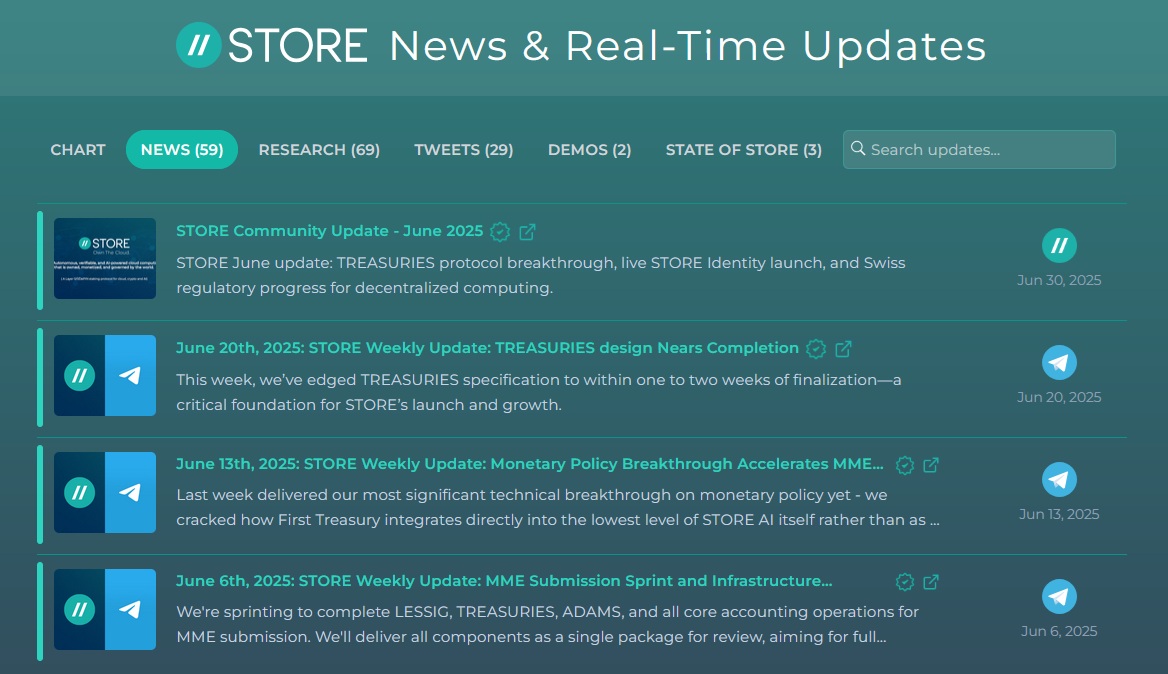
STORE Resources
For detailed investment analysis: https://storecloud.org/state-of-store-summer-2025/investment-summary
For live progress tracking: storecloud.org/economy
For complete transparency: storecloud.org/transactions
For democratic participation: storecloud.org/democracy
For detailed launch planning: storecloud.org/launch
For community discussion: t.me/thestorecloud
For real-time updates: https://x.com/thestorecloud
A Personal Note on Long-Term STORE Leadership
Let me be direct: We've taken on significant personal loans to keep this research alive during tough times. I wouldn't be here without the support of my wife and family. That's why I'm depositing 60% of my STORE holdings in TREASURIES for the maximum eight-year term, receiving protocol rewards from the 3% inflation budget alongside all other depositors. No special terms, no revenue-sharing—just the same constitutional mathematics governing everyone's participation.
All founding entities are making the same commitment: STORE Research, Footprint Labs, and the STORE Association itself. This represents 30% of the existing total supply locked up for eight years. We're taking the longest view possible because we believe in the research we started in 2017.
This journey has been challenging, the hardest thing I've ever done. It's pushed me to my limits, but it's made me better. Through this process, I've become a better leader, technologist, and CEO. I still have a lot to learn, but as my grandpa always told me, "What doesn't kill you makes you stronger." I've lived that through thick and thin, giving my best at each step.
We wouldn't be here without the crucial support of BlockTower Capital, Bitcoin Jack, Kevin Beaman, Derek Chan, Bill MacDonald, Mark Ramberg, Michael Orrico, Ragavendra Bhagavatha, Josh Lawler, Ahmed Alkhatib, the STORE Team, and many more who have helped me stay mentally sound, challenged my research, and shaped my thinking throughout this journey. These people kept this vision alive through tough bear markets and helped us stay disciplined during bull markets when we weren't ready because our research wasn't finished.
Key Terms
Constitutional Mathematics: Mathematical frameworks ensuring no single person or company can control more than 33% of decisions, while making the entire system MORE democratic as more people join. Think of it as democracy's mathematical immune system— - it gets stronger under pressure rather than weaker.
Hamilton's Ratio: Mathematical constraint ensuring systems become more distributed with scale rather than more centralized (named after Alexander Hamilton's economic sovereignty principles).
Byzantine Fault Tolerant Democracy: Democratic governance system that strengthens when up to 33% of participants act maliciously, similar to how immune systems strengthen under attack.
Augmented Intelligence: AI as enhancement of human coordination and decision-making rather than replacement of human governance.
Multi-Level Power Distribution: Mathematical principle where network stability increases with nodes while power concentration decreases - the inverse of traditional network centralization.
Legal Disclaimer: This document contains forward-looking statements about STORE Research, Inc. The information provided here and all materials pertaining to STORE Research, Inc. ("STORE") and STORE tokens are for general informational purposes only and is not a formal offer to sell or a solicitation of an offer to buy any securities. While information in this presentation is believed to be accurate and reliable, STORE and its agents, advisors, directors, officers, employees and shareholders make no representation or warranties, expressed or implied, as to the accuracy of such information and STORE expressly disclaims any and all liability that may be based on such information or errors or omissions thereof. STORE reserves the right to amend or replace the information contained in the presentation, in part or entirely, at any time, and undertakes no obligation to notify you thereof. STORE's decentralized cloud and AI endpoints comply with applicable U.S. state and federal laws, including privacy regulations. Data is secured through cryptographic protocols and segregated storage, but users should consult privacy policies for jurisdictional specifics. Revenue sharing subject to regulatory approval and may not materialize. Investment involves risk of loss. Consult qualified advisors before making investment decisions. Constitutional mathematics ensure no single entity controls >33% of network decisions, but do not guarantee investment returns or eliminate all risks.



